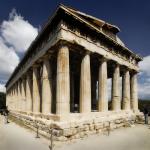|
This section contains 161 words (approx. 1 page at 300 words per page) |

|
In this well-known paradox, the Greek warrior Achilleus —whom the poet Homer called "swift-footed Achilles"—must race against the slowest runner imaginable: a tortoise. If only the tortoise is allowed the slightest head start, the Parmenidean logician Zeno is prepared to prove that-Achilles can never overtake it. Aristotle reports it as follows:
The so-called "Achilles" paradox claims that the fastest can never overtake the slowest runner in a race, since the runner who comes from behind must first reach the point where the front runner started, and so the slower one always holds a lead.
Another paradox, reported by Aristotle, reads as follows:
If "place" exists, where exactly is it? After all, everything that exists, exists in some "place." As a result, "place" too is in a "place." This goes on to infinity; and so "place" does not exist...
|
This section contains 161 words (approx. 1 page at 300 words per page) |

|




